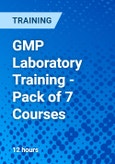This exclusive Pack contains 7 courses:
1. Laboratory Controls - Anticipate the Systems Based FDA Inspection2. Analytical Method Validation and Transfer
3. Auditing Laboratory Data Systems
4. Ensuring Integrity and Security of Laboratory Data for FDA / EU Compliance
5. Handling OOS Test Results and Completing Robust Investigations
6. Qualification (IQ, OQ, PQ) and Validation of Laboratory Equipment and Systems for Regulated Industries
7. Establishing a Product Stability Testing Program
Total Duration: 12 Hours
Agenda
TOPIC 1: Laboratory Controls - Anticipate the Systems Based FDA InspectionSpeaker: Danielle DeLucy
Duration: 75 Minutes
- Defining the Systems Based Inspection
- What are Lab Controls?
- FDA inspection techniques
- Why FDA switched to Systems based Inspections
- Preparing for a Laboratory Audit
- Training of analysts in proper inspection behavior
- Review of materials, equipment, tests and assays
- Inspection Expectations and Results/Real Life citations
- Responsibilities of QC/QA personnel during the audit
- Addressing observations or findings
- Real life citations
TOPIC 2: Analytical Method Validation and Transfer
Speaker: Kelly Thomas
Duration: 90 Minutes
- Regulatory Requirements/Guidance on Analytical Method Validation
- Terminology defined: qualification, validation, revalidation and verification
- FDA, EMA, ICH requirements and guidance
- Analytical Method Pre-Validation - Stage 1
- Analytical Target Profile (ATP)
- ICH Q8, Q9 and Q10 adherence - Pre-Validation Requirements
- Analytical Method Validation Characteristics - Stage 2
- Specificity, accuracy, precision, linearity, range
- LOD and LOQ
- Test Method Validation Protocol
- Elements of a validation protocol
- Pre-planning and planning steps
- Test Method Validation Report
- Elements of the validation report
- Elements of the validation protocol and the associated final validation report
TOPIC 3: Auditing Laboratory Data Systems
Speaker: Dr. Mark Powell
Duration: 60 Minutes
- Categories of laboratory data system (GAMP)
- Lifecycle management, archiving and backup
- What counts as raw data?
- Protecting the integrity of analytical data
- General guidance on assigning user privileges
- Operating system configuration.
- Application configuration
- Controls appropriate for chromatography data systems
- Practices that aid compliance with data integrity requirements
- Examples from recent FDA warning letters
TOPIC 4: Ensuring Integrity and Security of Laboratory Data for FDA/EU Compliance
Speaker: Dr. Ludwig Huber
Duration: 75 Minutes
- Eight key FDA/EU requirements for integrity and security of laboratory data.
- How FDA inspectors check integrity and security of data.
- Most frequent security and integrity issues: going through recent 483’s, EIRs and warning letters?
- The importance of limited access to ‘individual users’ rather than to groups.
- FDA compliant definition, acquisition, maintenance and archiving of raw data.
- Critical integrity and security issues during the entire life of laboratory data: from data acquisition through evaluation to archiving.
- Examples how to ensure and document data integrity.
- Documenting changes of laboratory data: paper, hybrid systems, electronic.
- The importance of electronic audit trail to document data integrity.
- Review of electronic audit trail: who, what, when and how.
- Ensuring timely availability through validated back-up and archiving.
- Going through representative 10 case studies: FDA observations, complete responses to each observation, corrective actions and preventive actions.
TOPIC 5: Handling OOS Test Results and Completing Robust Investigations
Speaker: Danielle DeLucy
Duration: 180 Minutes
Session 1: Guidelines for Detecting an OOS or Atypical Result
- Definition Atypical or Out of Specification Result?
- Review of the FDA Guidance for Industry on Investigating OOS Test Results
- Phase I: Initial Laboratory Investigation
- Phase II: Full Scale Investigation
- Root Cause Analysis Methods
- 5 Whys
- Flow Charts
- Checklists
- Fishbone Diagrams
Session 2: Testing the hypotheses regarding potential root causes
- Retesting
- Considering Other Batches
Session 3: Developing a proper CAPA plan to address any Corrective Actions
- How to properly document findings
- Example of a proper OOS investigation write up
TOPIC 6: Qualification (IQ, OQ, PQ) and Validation of Laboratory Equipment and Systems for Regulated Industries
Speaker: Joy McElroy
Duration: 180 Minutes
Session 1
- Introduction
- Quality Systems, Paradigm Shift, Global Perspectives
- QA/QC Validation
- Risk Assessment
Session 2
- Measurement, Resolution, Errors, and Uncertainty
- Regulatory and QS Requirements
- The Product Life Cycle Concept
- USP chapter 1058
- Examples of Various Systems
Session 3
- Strategies for Validation
- Documentation /Master Validation Plan
Session 4
- Training Requirements
- Examples of Various Systems
TOPIC 7: Establishing a Product Stability Testing Program
Speaker: Dr. David Lim
Duration: 60 Minutes
Part 1:
- Introduction of a Stability Testing Plan and Program
- Applicable Regulation and Requirements
- General Stability Considerations Applicable to a New Product (i.e. Potency)
- Storage Conditions
- Shelf Life Duration of Studies and Expiration Dates
- Container Closure Requirements
- Sample Size
- Sampling Plan
- Handling and Analysis of Samples
- Stability Schedule (Suggested Schedules for Conducting Stability Studies)
- Pre-approval and Post Approval Studies
- Stability Tests
- Reformulated Products
- Accelerated Temperature Studies
- Test Schedule Information
- Suggested Time Points and Expiration Dates Based on Testing Time Points
- Solid Dosage Forms Suggested Test Schedule
- Liquid and Semi-solid Types Products Suggested Test Schedule
- Reconstituted Products Suggested Test Schedule
- Temperatures of Studies Based on the Product Type
- Room Temperature Studies
- Elevated Temperature
- Refrigeration
- Freezing Temperature
- Special Humidity Considerations
Part 2:
- Analytical Testing Considerations
- Quality Control Release Assays and Methods
- Criticality of the Choice of Test that are Stability Indicators
- Choice of Methods with Meaningful Data or Stability Indicator
- Method Attributes
- Stability Testing Protocol Design
- How to Design a Protocol and a Report
- Stability Testing Data Management and Trending
- Trending Data
- Expiration Dating Extrapolation Using Data
- Manual versus Automated Data Management
- Advantages and Disadvantages
- You will also get answers to the following tough questions:
- For a medical device that has storage label of 15-30°C; Are stability studies at 15°C and 30°C or 25°C study sufficient?
- For a reconstitution study; product has an assigned expiration of 24 months; do I need to do reconstitution at 12 months (6, hours, 12 hours and 24 hours) and at 24 months (6, hours, 12 hours and 24 hours)?
- What is the accelerated storage for a product with real time storage of -20°C±5C?
- Is it an industry’s practice to do study one year past expiration?
- If the regression predicts failure before product expiration, what is the next step to do in stability?
Course Provider

Danielle DeLucy,
Owner ,
ASA Training and Quality Consulting LLCDanielle DeLucy, MS, is currently an independent consultant to the biologics and pharmaceutical industries specializing in the areas of quality assurance and quality systems. Prior to this role, Ms. DeLucy has been in the industry for 15 years serving in numerous quality management roles, such as the director of product quality, the oversight of sterility assurance practices and provided QA oversight of numerous filling and packaging operations.
Ms. DeLucy began her QA career as a quality control pharmaceutical microbiologist at Lancaster Laboratories, a contract laboratory where she performed various tests for their clients. In the years after, she has held positions in the quality management arena while increasing her responsibility. She has helped lead many regulatory health inspections and was instrumental in the coaching process of her peers prior to any inspection. Currently, she assists companies who are faced with warning letters and consent decrees establish more robust quality systems so that the company can succeed.
Ms Kelly Thomas,
Vice President ,
Stallergenes GreerMs. Thomas has over two decades of cGMP hands-on industry experience in both pharmaceutical and medical device manufacturing operations. Her experience covers all Quality Systems; as well as, all areas of validation; including, process/product validation, facilities validation, CSV and 21 CFR Part 11, test method validation, equipment/automated processes and cleaning validation.
Utilizing strategic thinking, risk based approaches, and Lean principles, she has demonstrated success in steering and managing complex projects within the pharmaceutical and medical device industries.
Dr Mark Powell,
Fellow ,
Royal Society of ChemistryDr Mark Powell is a Fellow of the Royal Society of Chemistry (RSC) with over thirty years’ experience as an analytical chemist. Mark was Honorary Treasurer of the RSC’s Analytical Division and led a working group on continuing professional development until July 2016, when his term of office ended. Between 2003 and 2013, he was the Analytical Development Manager, and later Scientific Manager, of a UK-based contract research organization which specialized in early-stage oral drug development. During this time, he was responsible for method validation, verification and transfer activities, as well as the qualification of laboratory instruments and computerized data systems. In 2013, he set up Mark Powell Scientific Limited, which provides training and consultancy services to pharmaceutical companies. Mark has since enjoyed working with companies of all sizes around the world on a variety of training and consultancy assignments, and has recently co-authored a White Paper on Pharmaceutical Data Integrity for the laboratory supply company VWR.

Joy McElroy,
Principle Consultant ,
Maynard Consulting CompanyUpon earning a degree in Zoology at North Carolina State University, Joy made her debut in the pharmaceutical industry in 1992 at Pharmacia & UpJohn performing Environmental Monitoring and Sterility Testing. Her hard work allowed her to move into a supervisory role at Abbott Laboratories where she oversaw their Quality Control Lab.
Now with 12 years experience as a consultant, and over 20 years total experience in the pharmaceutical and biotech industries, Joy has gained extensive knowledge of Quality Assurance, Process and Cleaning Validation, and Equipment Qualification. She has written and executed Equipment Qualification and Validation Protocols for numerous Companies such as Mallinckrodt, Wyeth Lederle, Merck, BioMerieux, Catalent, Phillips Medisize, Xcelience, and Novartis.
Joy specializes in Equipment Qualification, Cleaning Validation,Sterilization, Environmental Monitoring, and GMP Compliance Auditing.
Dr David Lim,
President and Principal Consultant ,
Regulatory DoctorDr. David Lim, Ph.D., RAC, ASQ-CQA. Dr. Lim is President and Principal of Regulatory Doctor. Dr. Lim frequently presents global regulatory and quality compliance topics in various forums and meetings. Recently, Dr. Lim developed 510(k) templates ready for use compliant with e-Copy and RTA policy. In addition, Dr. Lim developed FDA inspection checklists for drug and medical device manufacturers based on his analysis of FDA inspectional observations cited in 483s for the past seven years. Dr. Lim provides his feedback to regulatory agency (e.g., US FDA) through public comments and also served as a panel member during the FDA’s transparency public meeting in 2009. Dr. Lim contributes to the Regulatory Affairs Professional Society (RAPS) as an author and speaker. Dr. Lim leads and directs all research projects including, but not limited to, pharmacovigilance, medical device reporting, recalls and patient safety signals being conducted at the Regulatory Doctor.
Who Should Attend
- Quality Assurance Departments
- Quality Control Departments
- Research and Development Departments
- Regulatory Affairs Departments
- Compliance Departments
- Laboratory Staff
- Analytical Development Teams
- Operations Departments
- Manufacturing Departments
- Scientists
- Validation Managers
- Validation Coordinators
- Training Departments
- GMP auditors
- Consultants













